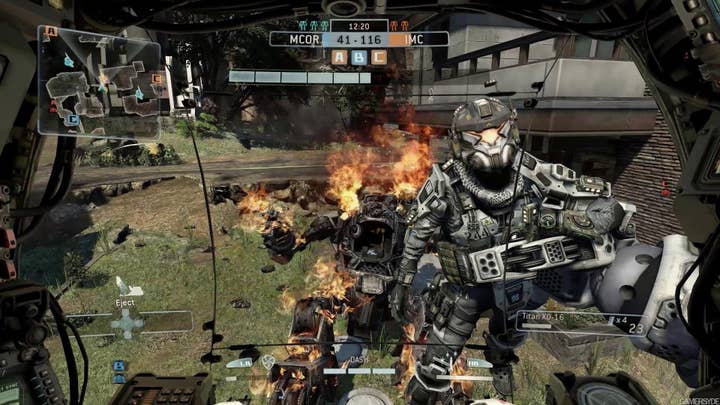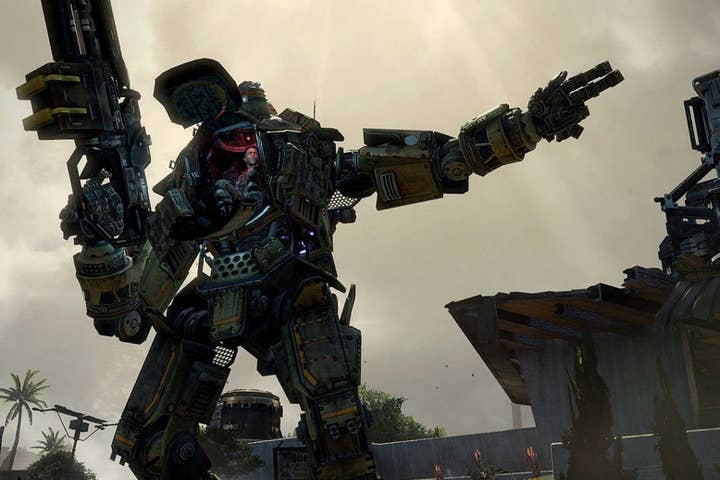Critical Consensus: Titanfall scores a big win for Xbox One
Respawn Entertainment aces its debut project, but will EA fumble another online launch?
If the official figures are to be believed, somewhere in the region of 2 million people joined Titanfall's open beta. And if the word trickling down the grapevine can be trusted, a great many of them finished it more than satisfied with what Respawn Entertainment has been building for the last four years. At a point in the new console generation when it's hard to find an enthusiastic proponent of the Xbox One, Titanfall seemed ready to thunder in from the skies and make us all think again.
"Titanfall is a testament to what talented people can accomplish when given permission to pursue the very essence of their dream"
EGM
And yet there is doubt churning away beneath the veneer of assured success. The big question around Titanfall is no longer, 'Will it be good?', it's, 'Will EA finally get it right?' With the painful memory of the SimCity launch only just fading into the ether, and - regardless of what Blake Jorgensen claims - the trauma of Battlefield 4's technical woes now the biggest, blackest mark on the company's decidedly spotty record, there is widespread and justified concern that Titanfall will be the latest casualty of EA's damaging inconsistency with major online launches. Indeed, as a rare new IP in a marketplace increasingly defined by sequels and reboots, Respawn's debut would be the most regrettable casualty of all.
Eurogamer is just one site that is holding back that all-important numerical rating, even going so far as to mark the occasion by introducing an entirely new approach to reviews. It would be unfair to say that EA alone is responsible for this change in tack from one of the most respected outlets in the games press, but it would be disingenuous to dismiss the role of Battlefield 4 - a game that still doesn't function as intended more than four months after its launch - in the final decision.

"Starting with Titanfall, we have decided to delay the full review of online-only games until we have been able to play them extensively on fully populated public servers, where the experience may be different to the controlled conditions available before a game is released," Eurogamer's "launch review" states. Titanfall's review will be updated, and its final score added, only when the chance to play on live servers is available. Nevertheless, besides some lingering concerns about Titanfall's premise and story - the words "cliched", "shallow", "dull" and "obvious" are all used in the space of a few sentences - Eurogamer's initial take on the game is almost entirely positive.
And it isn't alone. Titanfall may not be receiving many perfect scores, but out of the 29 reviews now linked to on Metacritic only one has scored the game below an 8. Not bad for a debut, and, in Joystiq's opinion, pretty good for just about any series or any genre. Respawn Entertainment has not only aced fundamentals like controls and level design, but added two potentially game-breaking features with no sign of stress or imbalance.
"All that complexity is expressed through a streamlined control scheme that doesn't feel complicated. It all comes naturally, and instead of feeling like work, Titanfall feels like a playground"
Polygon
The first, and most obvious, of these is the Titans, which, "don't tower over the game's design as you might think. Summoning one of these mechanical beasts does not portend victory any more than donning a piece of armour does. It's better to think of a titan as a resource, traded for the time it takes to build one, or for defeating pilots and each map's dim-witted AI drones, each one knocking some precious seconds off construction time.
"Once you've boarded and killed enough of them, you'll realise titans aren't really that interesting when they fight only one another. The close calls and quick shifts in the game's overall flow from pilot to titan, and back again, are diminished in big-guy standoffs, if not nullified. That isn't to say titans lack strategic options, but Titanfall's magic is in transitions, not the bots banging their heads against one another."
Those exhilarating transitions are made possible by Titanfall's other big feature: movement. When gameplay footage of Titanfall was first released to the world, the thunder and bombast promised by its towering mechs overshadowed the pilots' boost-assisted, parkour-inspired traversal of the maps. For Polygon - which, like Joystiq, awards the game 9 out of 10 - this unrestrained locomotion both brings Titanfall's disparate elements together and makes its clutch of existing ideas feel like an original experience.
"It's an enormous number of mobility options in addition to some very smooth, responsive shooting. But all that complexity is expressed through a streamlined control scheme that doesn't feel complicated. Double jumping is effortless, and wall-running is as easy as jumping toward a wall while running forward. It all comes naturally, and instead of feeling like work, Titanfall feels like a playground.

"Each of Titanfall's 15 maps presented a new opportunity to experiment with my environment, to see where I could get to on foot. I found 'lines' to take, alternating my wall-runs over extended spaces, making jumps I never thought I would make... Every nook or ledge presents its own challenge to find how best to make it there. This radically shifts the way that Titanfall's combat unfolds relative to the first-person shooter establishment. Most other multiplayer shooters exist as a flat plane with a few specific points of altitude. Horizontal stalking routes and cover-based shooting don't define Titanfall. Movement is as vertical as it is horizontal, and death could come from any direction at any time."
"Titanfall feels, in a way, like a hyper-budgeted mod that will only truly see its aims realised in the inevitable sequel"
Videogamer
Titanfall's sole 10 out of 10 - at the time of writing - comes from EGM, which attributes Respawn's unqualified success to a focused design that isn't hampered by the extra modes and features that dilute so many AAA games. "Titanfall is a testament to what a talented group of people can accomplish when given permission to pursue the very essence of their dream, without any caveats or superfluous decoration mandated by publishers," EGM's review opines, effectively dismissing relatively widespread concerns about its malnourished campaign mode. "Respawn Entertainment's debut is everything it needs to be-and nothing more."
For a counterpoint look no further than Videogamer, which sits at the opposite end of Titanfall's narrow spread of scores with 8 out of 10. Titanfall is indeed all of the things that so many reviews claim - lean, fast, strategic, spectacular - but it also feels like less than its brilliant concept suggested. Respawn aimed for a revolution, but it may have to settle for an evolution of the formula its core team helped to establish. And that should be no great concern to anyone, because for all of its achievements, Titanfall leaves plenty of room for improvement.
"Titanfall feels, in a way, like a hyper-budgeted mod that will only truly see its aims realised in the inevitable sequel. This is not necessarily a negative: it's a tremendously enjoyable game, and one that both expands upon, and strips back, some of the excesses of its spiritual predecessor.
"But for all its strengths, its reliance on tried and true modes and rigid maps stops Titanfall achieving its full potential. Capture the Flag, Attrition, and Domination are the best game types, but none of them show the same invention that's occurring elsewhere in the title, leading to a feeling of natural fatigue. Some of the maps also feel too similar to each other, lacking in distinction, and campaign multiplayer is sadly non-dynamic. A very good first instalment then, but the best is yet to come."

